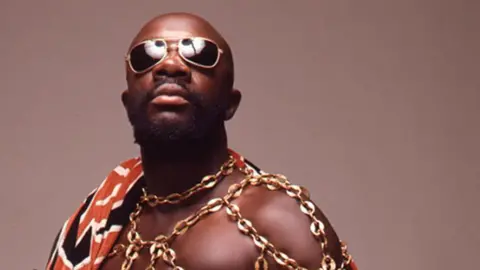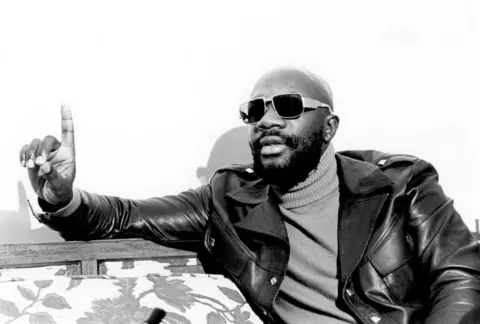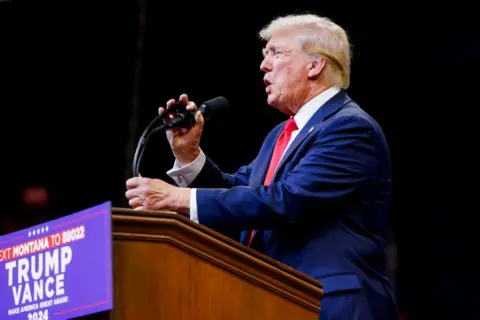
 Getty Images
Getty ImagesThe family of late soul singer Isaac Hayes has ordered Donald Trump to stop playing the star’s song Hold On, I’m Coming at his campaign rallies.
A letter sent to Trump and his team, and shared by Hayes’ son on social mediathreatens to sue the former US president if he does not comply by August 16.
The family is also seeking $3 million (£2.4 million) in licensing fees for the campaign to use the song repeatedly between 2022 and 2024.
The song, made famous by soul duo Sam and Dave, is a regular feature at Trump’s rallies and is often played before and after his speeches.
Hayes wrote the song in 1966 with Dave Porter, when he was a staff writer at Stax Records. He later won a Grammy and an Oscar in his own right, with hits like Shaft and Walk On By.
In their legal letter, Hayes’ family said they had “repeatedly asked” Trump to stop using the song. They went on to cite 134 occasions when the campaign went ahead anyway.
Their lawyer, James Walker, said the Trump campaign had “willfully and brazenly infringed copyright.”

 Getty Images
Getty ImagesHe then asked the campaign to remove all videos containing the song and to release a full statement acknowledging that Hayes’ family did not “authorize, approve or permit” the use of his music.
Walker added that the $3 million settlement request is a “heavily discounted” figure, given the frequency with which the campaign has aired “Hold On, I’m Coming.”
The letter also stated that if no resolution was reached and legal action was filed, the Hayes family would seek damages of $150,000 for each use of the song, or more than $20 million (£15.7 million).
The Trump campaign has not yet responded to the letter or the threat of legal action.
The Hayes family had previously criticized Trump for performing “Hold On, I’m Coming” at a National Rifle Association convention, less than a week after the 2022 Uvalde school shooting that killed 19 people.
“Our condolences go out to the victims and families of Uvalde and to the victims of mass shootings everywhere,” they wrote at the time.
Porter, who co-wrote the song, also wrote: “I did not and would not approve of them using the song for any of its purposes.”
Meanwhile, Sam Porter, who sang the original hit, opposed Barack Obama’s use of the song in his 2008 presidential campaign.
“I have not agreed to endorse you for the highest office in our country,” he said in a statement released at the time.
“My vote is a very private matter, between me and the ballot box,” he added.
Artists’ protests multiply
On Sunday, Hayes’ son, Isaac Hayes III, laid out his objections to Trump’s campaign.
“Donald Trump embodies a lack of integrity and class, not only through his continued use of my father’s music without permission, but also through his history of sexual abuse against women and his racist rhetoric,” wrote on Instagram.
“This behavior will no longer be tolerated and we will take swift action to put an end to it.”

 Getty Images
Getty ImagesThe Hayes family is the latest in a long line of musicians to complain about the Trump campaign.
Artists who have told the politician to cease and desist include The Beatles, Neil Young, Adele, Bruce Springsteen, Sinead O’Connor and Aerosmith.
In fact, the list of artists who protested is so long that the argument has its own Wikipedia page.
On Saturday, Celine Dion’s team also protested the use of her song My Heart Will Go On at a rally in Montana.
“This use is in no way authorized and Celine Dion does not endorse this or any similar use,” the statement read.
“And really, THAT song?” he added, alluding to the fact that the track was recorded for the film Titanic, which is about a sinking ship.
However, musicians have had only limited success in preventing politicians from using their music.
In the United States, election campaigns are required to obtain a political entity license from music rights organization BMI, which gives them access to over 20 million songs to use in their rallies.
Artists and publishers can ask to have their music removed from the list, but organizers appear to rarely check the database to make sure they have permission.
“They don’t care about artists’ rights as much as you might like,” said Larry Iser, a lawyer who represented Jackson Browne when he sued Republican candidate John McCain over one of his songs in a 2008 commercial. (The case was later settled.)
“It’s not just Trump’s campaign,” Iser told Billboard magazine“Most political campaigns are reluctant to remove the song.”
Cases rarely, if ever, end up in court: both sides usually back down after a flurry of legal letters.





